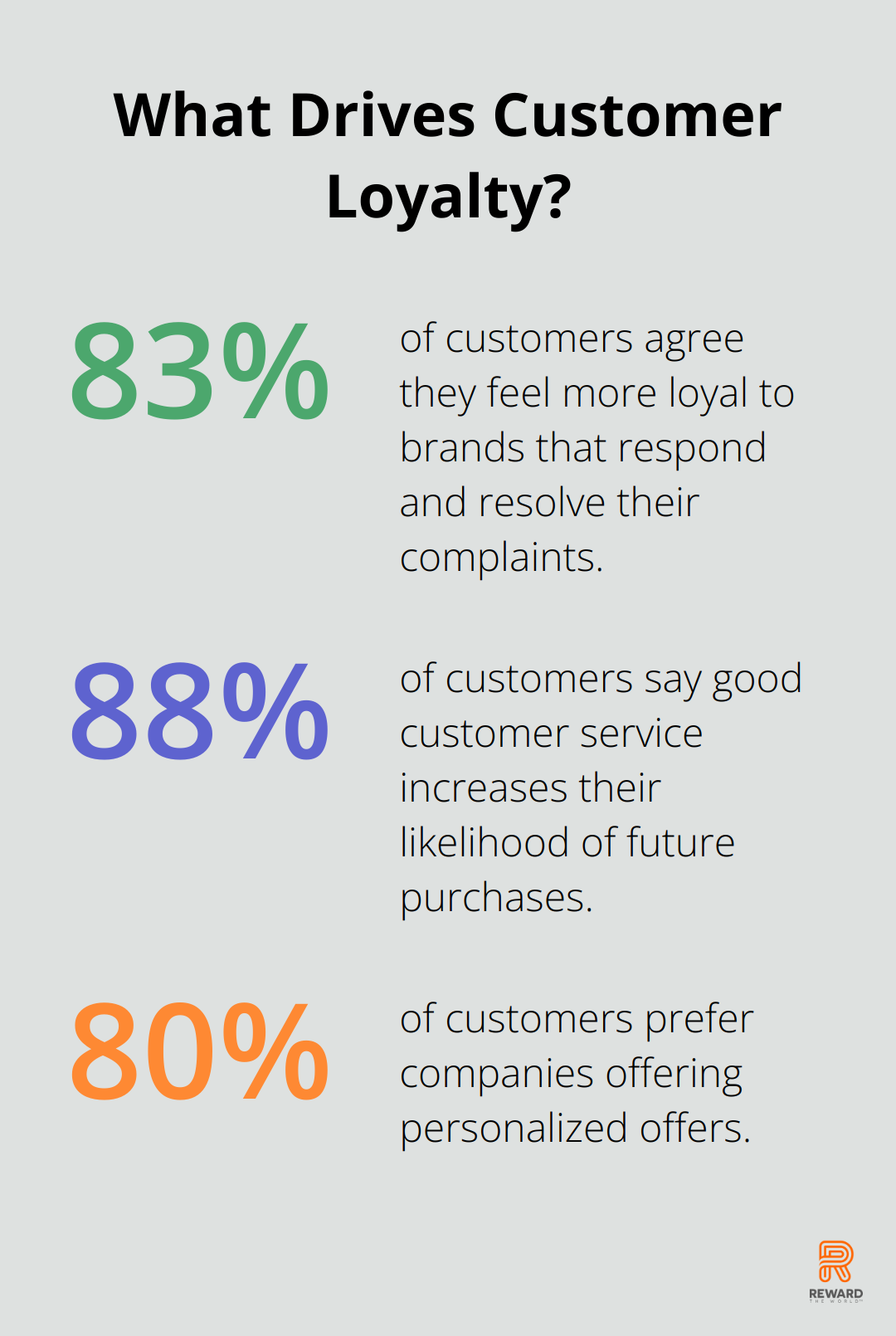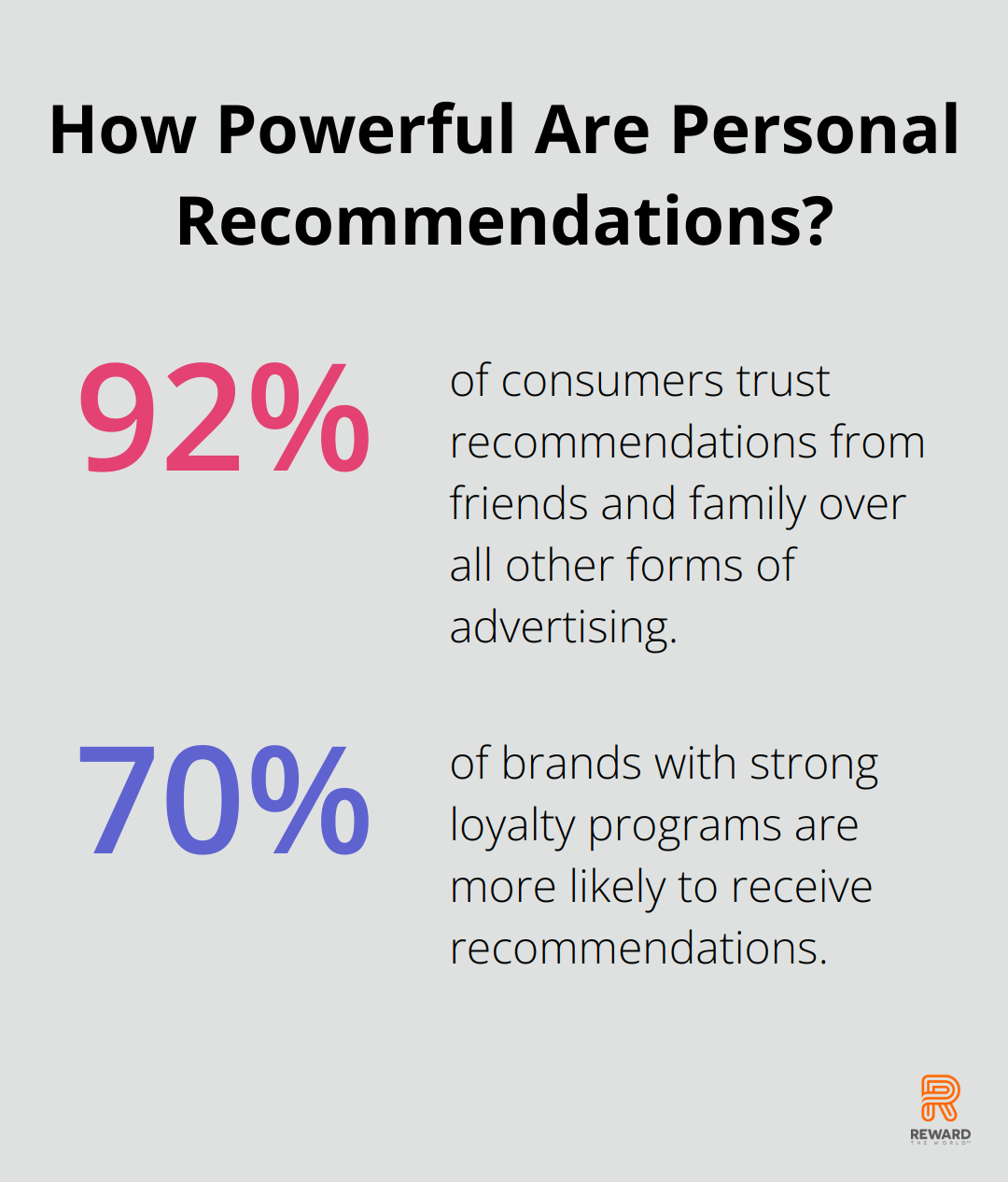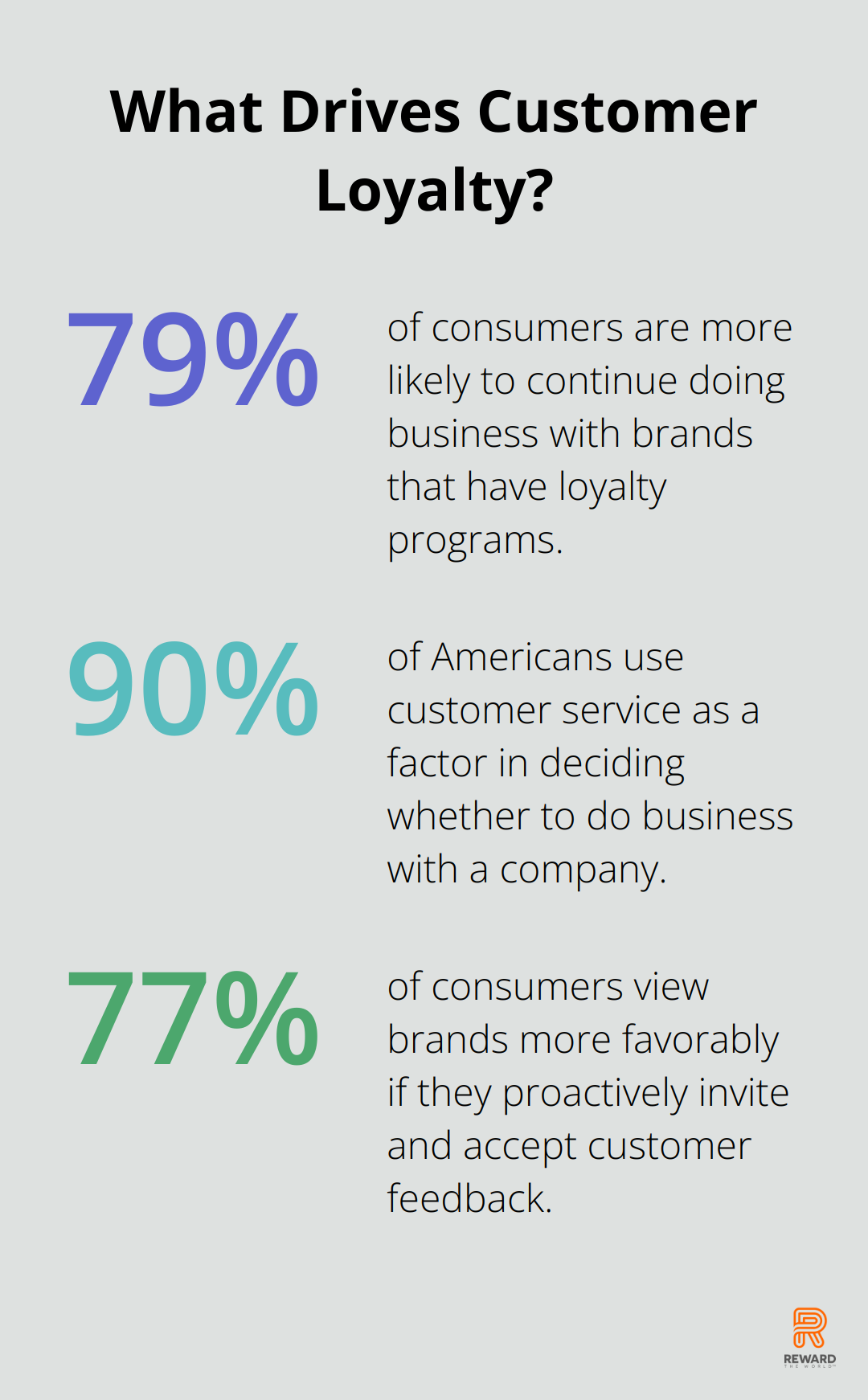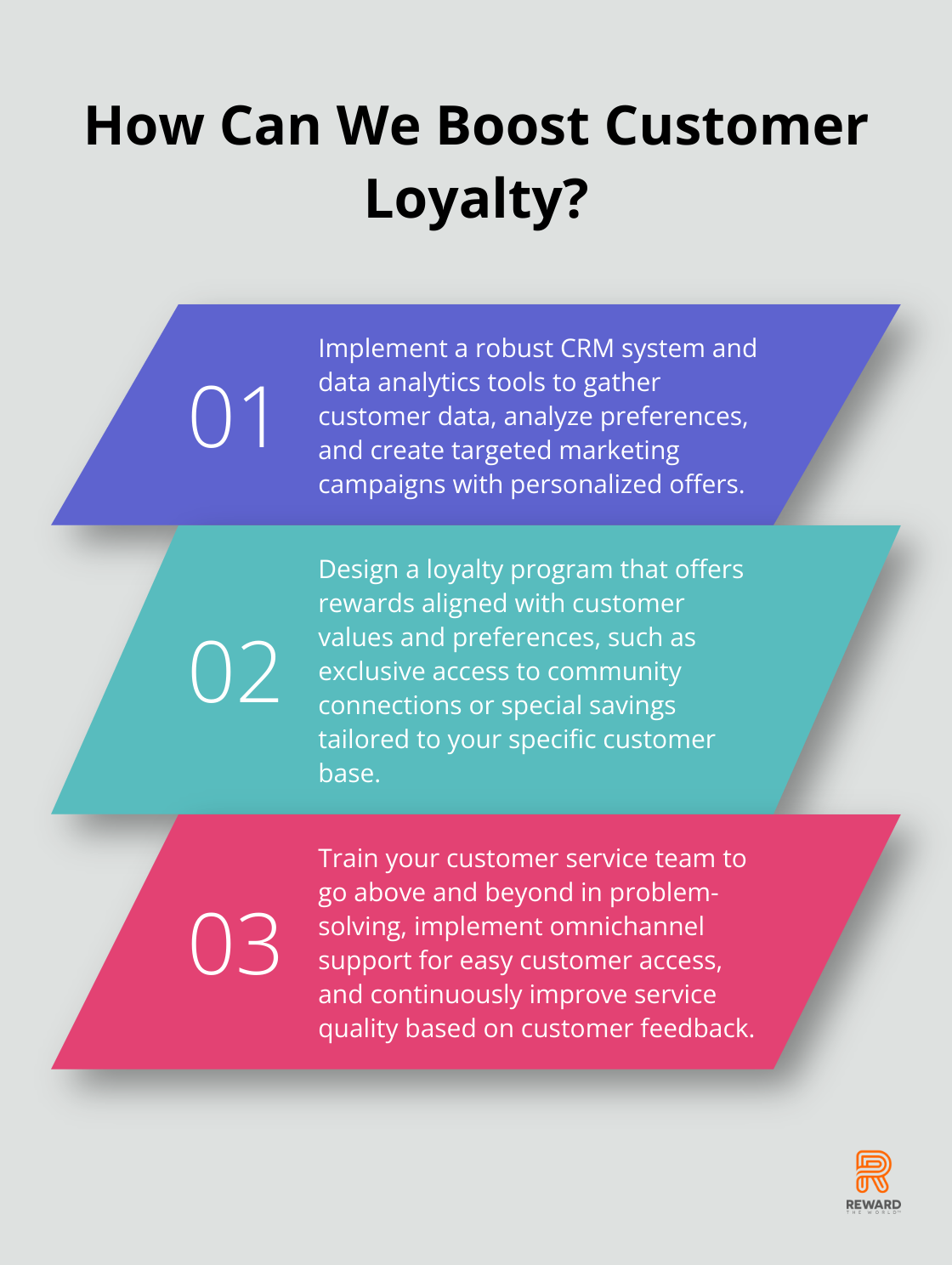
Customer loyalty is the cornerstone of business success in today’s competitive market. At Reward the World, we’ve seen firsthand how loyal customers drive growth and profitability for companies across industries.
In this post, we’ll explore the concept of customer loyalty, its impact on businesses, and effective strategies to foster it. For those seeking a comprehensive overview, the Customer Loyalty Wiki offers additional insights into this crucial topic.
What Drives Customer Loyalty?
The Essence of Customer Loyalty
Customer loyalty transcends mere repeat purchases. It represents a complex relationship between a business and its customers, built on trust, satisfaction, and emotional connection. At its core, customer loyalty means consistently choosing a brand over competitors, regardless of price or convenience.
Diverse Forms of Customer Loyalty
Customer loyalty manifests in various forms. Some customers remain loyal due to habit or convenience, while others develop an emotional attachment to a brand. A Salesforce study reveals that 68% of customers report feeling an emotional connection to the brands they frequently purchase from. This emotional bond often proves the strongest form of loyalty, as it resists competitive offers or minor service issues.
Key Influencers of Customer Loyalty
Several factors shape customer loyalty:
- Trust: A study found that 83% of customers agree they feel more loyal to brands that respond and resolve their complaints.
- Exceptional Service: Salesforce reports that 88% of customers say good customer service increases their likelihood of future purchases.
- Product Quality: Customers expect reliable performance with each brand interaction.
- Personalization: 80% of customers (according to Salesforce) prefer companies offering personalized offers.
Values and Ethics: The New Loyalty Drivers
In today’s market, a company’s values and ethical practices significantly impact customer loyalty. A Deloitte study highlights that Gen Z and Millennial shoppers show a higher inclination to support brands that align with their values and benefit society.
The Technology Factor
Technology plays an increasingly vital role in shaping customer loyalty. From AI-powered personalization to seamless omnichannel experiences, businesses that leverage technology effectively can create more engaging and convenient customer interactions. (Reward the World’s platform, for instance, offers instant reward delivery and robust analytics to enhance customer engagement.)

As we explore the business impact of customer loyalty in the next section, we’ll see how these driving factors translate into tangible benefits for companies that successfully cultivate loyal customer bases.
How Customer Loyalty Drives Business Success
The Revenue Boost from Loyal Customers
Customer loyalty translates directly into increased revenue. A new report claims that, for the first time ever, marketing to existing customers is exceeding that to new ones. This dramatic impact stems from loyal customers’ tendency to spend more over time. Research from Temkin Group underscores this point: loyal customers are 5x more likely to repurchase, 5x more likely to forgive, 4x more likely to refer, and 7x more likely to try a new offering.
Cost-Effective Marketing Through Retention
Acquiring new customers costs significantly more than retaining existing ones. Harvard Business Review discusses the importance of customer acquisition and retention costs in determining profitability. This stark difference highlights the financial wisdom of focusing on customer loyalty. Businesses can slash their marketing expenses by implementing effective retention strategies (such as personalized loyalty programs).
The Power of Word-of-Mouth Marketing
Loyal customers become brand advocates, providing invaluable word-of-mouth marketing. Nielsen’s research shows that 92% of consumers trust recommendations from friends and family over all other forms of advertising. This organic promotion not only comes at no cost but also proves highly effective. A Texas Tech University study found that brands with strong loyalty programs are 70% more likely to receive recommendations.
Enhanced Customer Lifetime Value
Loyal customers contribute significantly to a business’s long-term success through increased Customer Lifetime Value (CLV). These customers not only make repeat purchases but also tend to spend more per transaction. They often explore a wider range of products or services, further boosting their value to the company. Businesses can maximize CLV by understanding and catering to loyal customers’ preferences and needs.
Resilience During Economic Downturns
A strong base of loyal customers provides businesses with a buffer during economic uncertainties. Loyal customers are more likely to continue their patronage even when faced with financial constraints, choosing to cut back on other expenses instead. This loyalty helps businesses maintain a steady revenue stream during challenging times, showcasing the long-term benefits of investing in customer relationships.

To harness these benefits, businesses must invest in strategies that foster loyalty. This includes personalizing customer experiences, offering valuable rewards, and consistently delivering exceptional service. Companies can implement these strategies efficiently and effectively, turning customer loyalty into a powerful engine for business growth.
The next chapter will explore practical strategies businesses can employ to build and maintain customer loyalty, ensuring they reap these substantial benefits.
How to Build Lasting Customer Loyalty
Create Personalized Experiences
Personalization stands as a cornerstone of strong customer relationships. Salesforce reports that 80% of customers now consider the experience a company provides to be as important as its products and services. This extends beyond addressing customers by name in emails. It involves the use of data to understand customer preferences, purchase history, and behavior to tailor interactions and offers.

Netflix’s recommendation algorithm exemplifies this approach, keeping viewers engaged by suggesting content based on their viewing history. Similarly, Amazon’s personalized product recommendations drive up to 35% of their total sales.
To implement personalization effectively, businesses should invest in robust Customer Relationship Management (CRM) systems and data analytics tools. These will help gather and analyze customer data to create targeted marketing campaigns and personalized offers.
Implement a Value-Driven Loyalty Program
Loyalty programs serve as a powerful tool for encouraging repeat business, but they must offer real value to be effective. A study by Bond Brand Loyalty found that 79% of consumers are more likely to continue doing business with brands that have loyalty programs.
When designing a loyalty program, businesses should focus on rewards that align with their customers’ values and preferences. For instance, REI’s loyalty program offers members exclusive access to community connections and special savings, appealing to their adventure-seeking customer base.
(It’s worth noting that Reward the World’s platform excels in this area, offering a wide range of instantly deliverable rewards across various categories. This flexibility ensures that businesses can cater to diverse customer preferences, increasing the perceived value of their loyalty programs.)
Provide Exceptional Customer Service
Outstanding customer service plays a vital role in building loyalty. A study by American Express found that 90% of Americans use customer service as a factor in deciding whether to do business with a company.
Companies should train their customer service team to go above and beyond in solving customer issues. Zappos, for instance, is renowned for its customer service, with representatives empowered to take extraordinary measures to ensure customer satisfaction.
Businesses should implement omnichannel support to make it easy for customers to reach them through their preferred channels, whether it’s phone, email, chat, or social media. They should use customer feedback to continuously improve their service quality.
Engage Consistently and Meaningfully
Regular, meaningful engagement keeps a brand top-of-mind and strengthens customer relationships. However, it’s important to strike the right balance – too little communication can lead to disengagement, while too much can be perceived as spam.
Companies should use a mix of channels for engagement, including email, social media, and in-app notifications. They should tailor their content to provide value, whether it’s educational content, exclusive offers, or behind-the-scenes glimpses of their brand.
Sephora’s Beauty Insider community provides an excellent example of meaningful engagement. It offers a platform for customers to share tips, ask questions, and interact with the brand, fostering a sense of belonging among its members.
Continuously Gather and Act on Feedback
Customer feedback proves invaluable for improving products, services, and overall customer experience. According to a Microsoft report, 77% of consumers view brands more favorably if they proactively invite and accept customer feedback.
Companies should implement various feedback collection methods, such as surveys, focus groups, and social media monitoring. More importantly, they should act on the feedback they receive. When customers see their input leading to tangible improvements, it strengthens their loyalty to the brand.
(Starbucks’ “My Starbucks Idea” platform allows customers to suggest and vote on ideas for improving the company’s products and services. This not only provides valuable insights but also makes customers feel heard and valued.)
Final Thoughts
Customer loyalty drives business success in today’s competitive landscape. Loyal customers increase revenue, reduce marketing costs, and provide invaluable word-of-mouth marketing. They also serve as a buffer during economic downturns and contribute to long-term success through enhanced Customer Lifetime Value.

Companies must prioritize personalized experiences, implement value-driven loyalty programs, and provide exceptional customer service to harness these benefits. Consistent engagement with the audience and active solicitation of customer feedback create a virtuous cycle of satisfaction and growth. (Resources like the customer loyalty wiki offer additional insights for businesses looking to enhance their loyalty initiatives.)
Businesses aiming to elevate their customer loyalty strategies can leverage platforms like Reward the World. With its global reach and instant reward delivery, Reward the World equips businesses with tools to create engaging loyalty programs and drive customer retention. Companies that invest in these strategies will create lasting customer relationships and thrive in an increasingly competitive marketplace.
